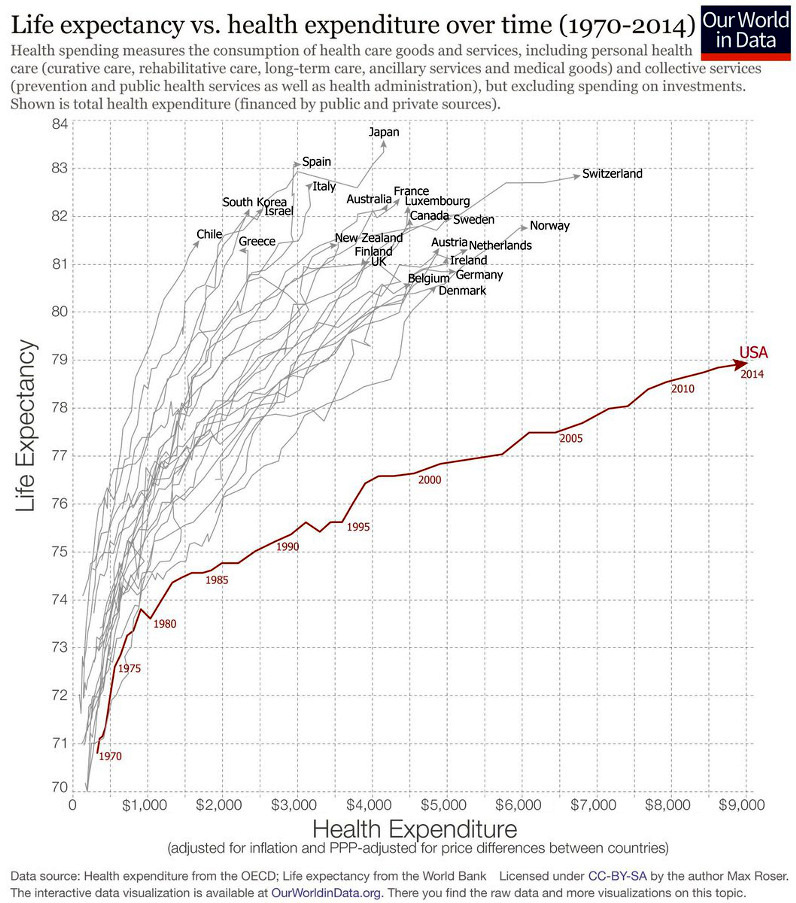The Daily Escape:

Ribbon Chapel, Onomichi Japan – photo by Koji Fujii
Andrew Ross Sorkin wrote about Warren Buffet and the Berkshire Hathaway annual meeting in Omaha. Thousands of people attend these meetings, which are known as “Woodstock for capitalists.” Sorkin reports that Buffet made this comment:
The tax system is not crippling our business around the world.
Sorkin said that Mr. Buffett, was blunt and pointed, implicitly rebuking his fellow chief executives, who have been lobbying the Trump administration and Washington lawmakers to lower corporate taxes. Buffett said that those who have been single-focused on seeking relief from their tax bills would be smart to shift their attention to health care costs, which are growing and swallowing evermore corporate profits. The Kaiser Family Foundation reports that 49% of Americans, about 156 million, are insured by their employer. More from Sorkin:
The need for corporate tax relief has become the lodestar of the corner office, with CEOs rhapsodizing over President Trump’s plan to try to stimulate growth by cutting tax rates for businesses.
But as Mr. Buffett pointed out, these chief executives are missing the bigger issue: As a percentage of our GDP, the cost of maintaining our American health care system is rising at an alarming rate. And Corporate America pays a big (and growing) chunk of that bill.
Buffett wasn’t talking about the cost of health insurance, which is a fraction of the total cost of health care. He suggests that today’s corporate tax rates are a distraction, not a true impediment to growth:
If you go back to 1960 or thereabouts, corporate taxes were about 4% of GDP…And now, they’re about 2 % of GDP.
While tax rates have fallen as a share of gross domestic product, health care costs ballooned:
About 50 years ago, health care was 5% of GDP, and now it’s about 17%.
Buffett is a smart guy. He raises an argument for focusing on the underlying costs of our health care system, something that goes far beyond the debate around the Affordable Care Act, or what will replace it. Buffett says that our global competitiveness has fallen largely because our businesses were paying far more for health care — a tax by another name — than those in other countries.
As Buffett said: (brackets by the Wrongologist)
When American business talks about [corporate taxes] strangling our competitiveness, or that sort of thing, they’re talking about something that as a percentage of GDP has gone down…While medical costs, which are borne to a great extent by business, have swelled.
Here are the facts:
- In 1960, corporate taxes in the US were about 4% of GDP. The percentage fell steadily, reaching a bottom in 1983 before rising slightly over the last few decades. Today, it is 1.9%.
- In the meantime, health care costs as a percent of GDP have skyrocketed. Today our health care costs are 17.1% of GDP, up from 13.1% in 1995.
- Germany’s cost is 11.3%, up from 9.4% during the same period. Japan’s is 10.2%, up from 6.6%. Britain’s health care costs are 9.1% of GDP, up from 6.7% percent in 1995.
That makes our health care cost disadvantage far greater than our tax differential. It harms American companies in particular, since they bear such a large share of those costs, which firms in our competitor countries do not. US Corporations spend $12,591 on average for coverage of a family of four, up 54% since 2005, according to a study by the Kaiser Family Foundation.
But Congress avoids the issue, and CEOs don’t talk about it. A final quote from Warren:
It’s very tough for political parties to attack it…it’s basically a political subject…
In fact, Buffett’s partner, Charlie Munger, is the rare Republican (Buffett is a Democrat) who has advocated for a single-payer health care system. Under his plan, the US would enact a sort of universal type of coverage for all citizens — perhaps along the lines of the Medicaid system.
Which brings Wrongo to his final point: Medicaid expansion is the one part of Obamacare that can be said unequivocally to work. It’s a single payer program funded by the Federal government. So it’s bitterly ironic that the Republican’s reaction to Obamacare is to assault and roll back an existing Federal program, from LBJ days.
Of course, kicking poor people who benefit from Medicaid will always be popular with Republicans. So, Republicans, by making Medicaid worse, will try to restore their natural order of things.
Lazy, uninformed voters = Lazy, uninformed legislators = Lazy, uninformed policy.
It’s that simple.

